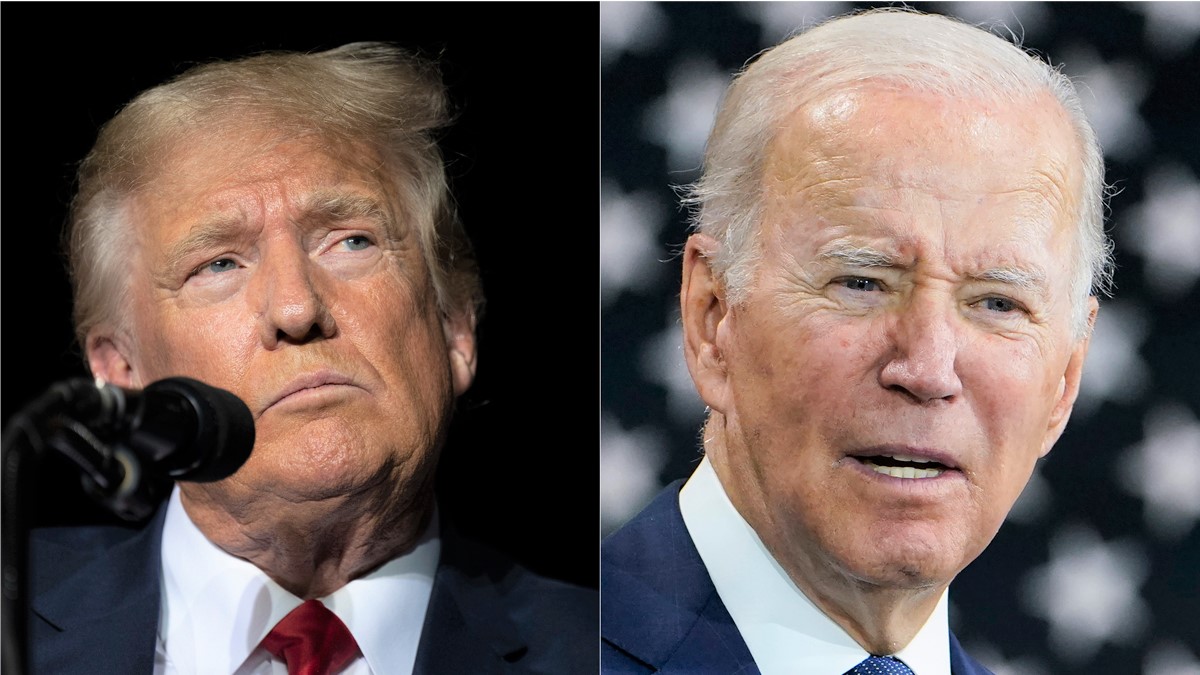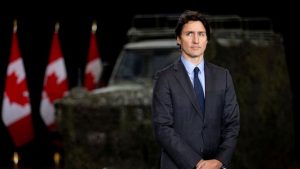
Biden-Trump debate: Where they stand on AI, TikTok and chips

President Joe Biden and former President Donald Trump are preparing to debate on Thursday, as they run neck-and-neck in the U.S. presidential campaign ahead of the election in November.
The election outcome is sure to have a huge impact on Asia, as Biden and Trump offer sharply different visions for America’s role in the world, as well as management of trade and the U.S. economy, policy toward climate change and the development of technology.
In a series of articles, Nikkei Asia examines where the two rivals stand on the issues and the probable consequences of a victory by either candidate. In this article, we examine tech policies.
From artificial intelligence to TikTok, Biden and Trump hold many differing views on how to regulate the tech industry. But they have one goal in common: to outcompete China in tech.
Artificial intelligence
AI is a growing regulatory concern in many countries including the U.S. With the technology becoming more prevalent and powerful following the launch of generative AI product ChatGPT, Biden issued an executive order in October intended to guide the safe use and development of AI. But the federal government has taken little action since then.
Neither Biden nor Trump has offered a concrete road map to regulate AI and related companies. But both have cited the importance of the U.S. maintaining its technological edge over China, particularly in the realm of artificial intelligence.
During Biden’s administration, the U.S. has substantially limited China’s access to technologies critical in artificial intelligence development and deployment, including the most advanced AI chips. Some lawmakers are pushing for export controls on open source AI models.
But given AI’s risks, Biden and Chinese President Xi Jinping agreed at the APEC summit in November to keep an open dialogue on the field. Top-level envoys from the U.S. and China held their first AI meeting in Geneva during May to exchange views on ways to collaborate in managing the risks.
This dialogue likely would end under Trump, said Xiaomeng Lu, director of geotechnology at the Eurasia Group think tank.
“Trump might not see as much value in establishing a multilevel, intergovernmental communication channel on issues like AI,” she said. “He just wants to talk to Xi directly.”
Semiconductors
Biden has sent shock waves to American and global chipmakers through the $52 billion CHIPS and Science Act, as well as a series of export controls that restrict selling advanced chips and chipmaking tools to China.
The CHIPS Act, signed by the Democrat in 2022, aims to reduce American reliance on the Asia-centric semiconductor supply chain and bolster domestic manufacturing. U.S. and Asian chipmakers such as Intel, Taiwan Semiconductor Manufacturing Co. and Samsung have been granted billions of dollars under the bill to establish new fabs in the country.
U.S. Commerce Secretary Gina Raimondo wants more government support for the semiconductor industry, including a second CHIPS Act for the U.S. to stay competitive.
Eurasia Group’s Lu said Trump is unlikely to support a second CHIPS Act, as the former president, like many Republicans, holds unfavorable views toward such industrial policies. But Trump has voiced concern about the national security aspect of the semiconductor industry and in 2020 welcomed TSMC’s plans to build an Arizona factory.
Trump likely will support the industry in other ways such as corporate tax cuts, which he pushed during his presidency, Lu said.
The U.S. under both presidents has issued various export restrictions on chips and chipmaking tools to limit China’s access to advanced semiconductors as Beijing vows to become self-reliant in the industry.
Though Trump also enacted semiconductor export controls to limit chip access for companies like Huawei Technologies, Washington’s efforts to curb China’s semiconductor development became more effective under Biden as more allies such as Japan and the Netherlands joined the effort.
Chip industry participants expect the current export restrictions targeting China to stay during a second Biden or Trump administration.
“It’s hard to imagine what more restrictions the next administration can add on chips, because whatever can be done is already done,” a California-based executive at a leading chipmaker told Nikkei Asia.
Outbound tech investment
The U.S. Treasury Department has proposed a rule to restrict American financing from supporting Chinese development of advanced technologies such as AI, semiconductors and quantum technology.
The draft rule, issued Friday, followed Biden’s executive order last August that declared a national emergency in dealing with “countries of concern” rapidly developing “sensitive technologies,” which “significantly enhances their ability to conduct activities that threaten the national security of the U.S.”
China, Hong Kong and Macao are the only names identified as “countries of concern” in the executive order.
Scrutiny of outbound tech investment likely would continue under a Trump administration, as he floated the idea of screening outbound investment to China as well.
The Foreign Investment Risk Review Modernization Act of 2018, enacted during Trump’s term, initially included provisions to give the federal Committee on Foreign Investment in the United States (CFIUS) the power to review outbound investment activities. But lobbying from the business community led to the removal of the provisions from the bill.
TikTok
The fate of the popular short-video app TikTok is up to the courts. In April, Biden signed a bill that orders a divestiture by its Chinese owner ByteDance within nine months or the app will face a nationwide ban. The company’s lawsuit to challenge the bill is waiting to be heard by federal judges.
If no injunction is issued, the 270-day clock runs out around late January, coinciding with the next presidential inauguration. The next president will have the power to grant a three-month extension on the divestiture effort before pulling the plug on TikTok.
Trump has flip-flopped on the matter. As president, he issued two executive orders in 2020 targeting the company. One banned TikTok in the U.S. but was blocked by a federal judge that year and revoked by Biden in 2021.
The other required ByteDance to divest its U.S. assets and delete all American user data. This order led to a yearslong investigation into TikTok by CFIUS. The agency told ByteDance to sell its stake in TikTok last year, but no action has been taken since then.
But earlier this year, Trump said a ban on TikTok would benefit Facebook, which he considers “an enemy of the people.” Possible reasons for the change of heart include the platform’s appeal to young voters and that some of the app’s billionaire backers are major donors to his campaign.
TikTok remains a key campaign tool for the candidates. Both have joined the app and built a following despite the potential ban.
- Kaski Court Grants Bail to Rabi Lamichhane in Embezzlement Case
- Upper Mustang Sees Over 4,000 Foreign Tourists in 2024, Marking a 14% Rise
- Hollywood Wildfires Ravage Los Angeles, Claiming Lives and Thousands of Homes
- Nepal Deports 147 Chinese Nationals in 2024 Amid Rising Concerns Over Crimes and Overstays












Comments